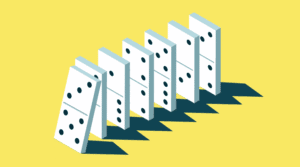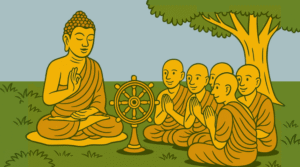When the Buddha does talk about being in the present moment he never says to just hang out in the present moment, be fully present to the present moment.
It is always in the context of death contemplation — death could happen at any time and there are duties that have to be done. If you don’t do them now, they are not going to get done.
The duties
There is one famous poem in Majjhima 131. It starts out saying that:
you shouldn’t chase after the past or place expectations on the future.
What is past is left behind.
The future is as yet unreached.
Whatever quality is present, you clearly see,
right there, right there,
not taken in, unshaken.
Ardently doing what should be done today,
for — who knows? — tomorrow death.
So, there’s this concept of having a duty that should be done. We focus on the present moment because we are creating suffering in the present moment, and we want to learn how to stop. It comes from our actions so, it is important to understand the Buddhist’s take on what exactly are we doing in the present moment, how does it shape our experience.
What to accept
The Dharma teaches us what to accept — There are the influences that are coming in from the past. We can’t go back and change our past karma, but we also have the ability to do something about this raw material coming from the past and shaping it into our present experience. So we have a choice in how we are going to shape that material. And that’s something, also, we have to accept – that we are playing a role in this.
So, we have to look in to see what is that role that we are playing.
What not to accept
Things that the Buddha tells us not to accept in addition to what we are doing that is unskilful — he says he doesn’t accept the lazy and defeatist attitude.
Suffering does have a source, but it doesn’t always come from your past actions. It comes from what you are doing right now.
When you look at the images of the Buddha people on the path, there’s never an image of somebody sort of sitting back and just accepting. It’s always images of people who are searching, people who are engaged in battle people who are trying to develop a skill, always trying to learn to be more skilful, and how to shape the present moment.
He actually calls the Eightfold Noble Path the unexcelled victory in battle. So, there is a battle to be won; there’s work to be done.
Daily contemplation
The Buddha gives you another example: every night, when the sun sets, remind yourself –
“I could die tonight. Am I ready to go or are there any qualities in my mind that would make it difficult for me to let go?”
And if so, focus on working on those qualities, abandoning those causes of suffering.
The same thing, in the morning, when the sun rises,
“This could be my last sunrise. I could die today. Am I ready to go? If not, there’s work I got to do right now.”
The Four Noble Truths
These duties that the Buddha was referring to here, of course, are the duties that come under the Four Noble Truths.
There is suffering.
What is the suffering? You want to comprehend it.
There are a lot of things we do that create suffering, but we just hold to them. And the Buddha wants you to look carefully at that. Do you see (that when) you’re doing this, you’re causing yourself suffering. Is it worth doing it? That’s the duty with regard to the First Noble Truth.
The Second Noble Truth is the cause of suffering, which is craving.
That should be abandoned. When you see the cause of suffering that’s what you let go. And most of us get these duties confused. We try to let go of the suffering.
First, you (have to) understand what induced you to cling to begin with. What was the desire that you had? That’s what you let go of.
Otherwise, it is like going into a house seeing the house is filled with smoke, and you put out the smoke. As long as you keep putting out the smoke, it’s not going to stop. You got to find where is the fire. Put out the fire, then you’re done.
The duty with the Third Noble Truth, which is the cessation of suffering.
It is to realise when you finally do let go of the craving, there is a moment when the suffering ceases. But the Buddha says, ultimately, there is a point where you stop the craving entirely. And that’s the end of suffering. You have dispassion for it. So, you try to realise that.
And then, there’s a path.
The path is to be developed. By engaging in the present moment in a more skilful way, we create better conditions for the future.
There is hope
And also, we are not stuck here. We are not stuck in this house.
The house is constantly burning. You can’t stop it from burning, but the Buddha says there is a fire escape. And so, we look for the fire escape; do the practice.
Ultimately, there is freedom that is not flammable, that will not burn us, and it’s outside of past, present, and future entirely. Because it is outside of time, it’s not going to be touched by anything.
Once you gain it, you gain it for good.



